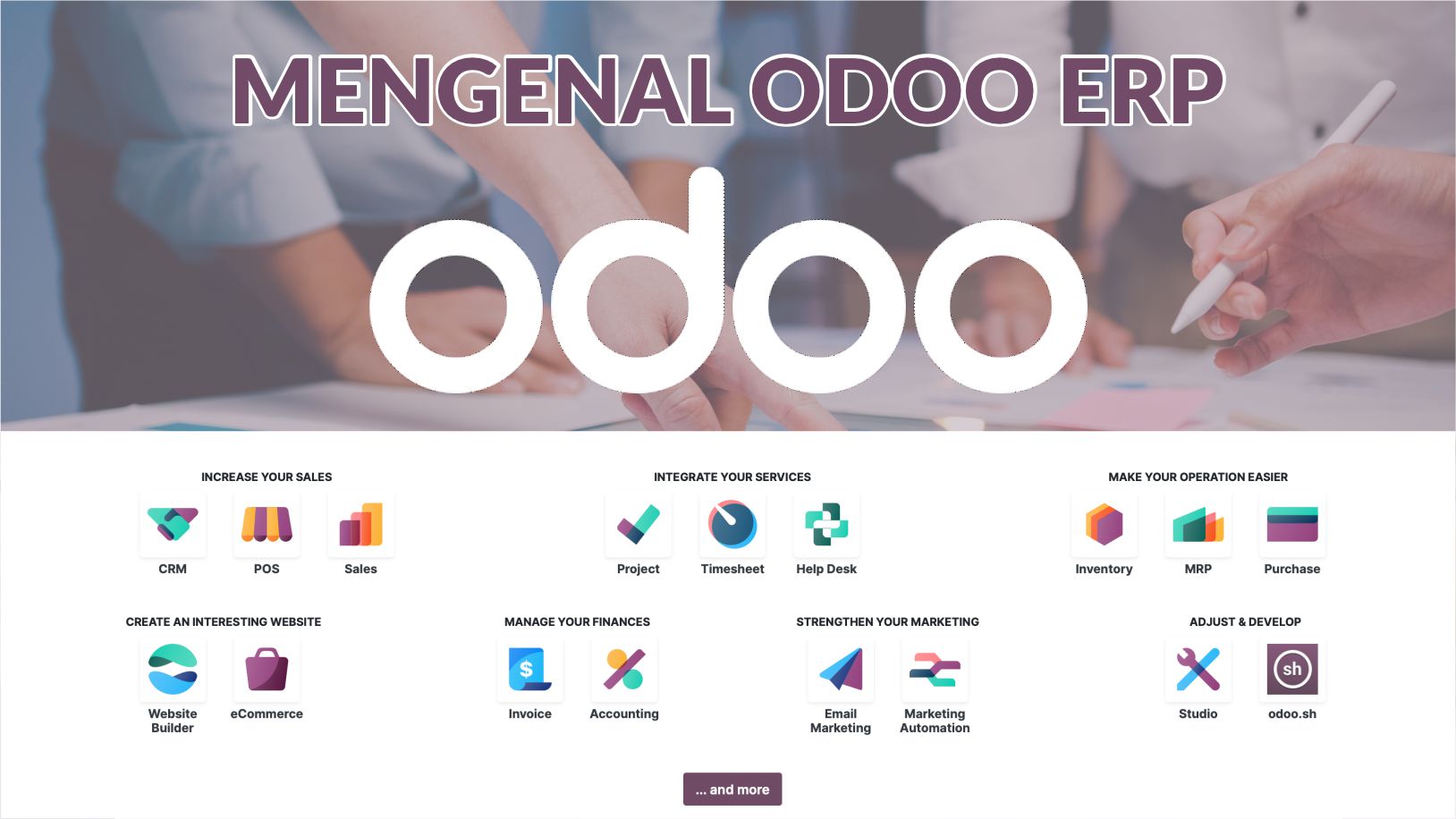Enterprise Resource Planning (ERP) systems have become indispensable tools for businesses of all sizes seeking to streamline operations, improve efficiency, and gain a competitive edge. Among the myriad of ERP solutions available, Odoo stands out as a highly versatile and modular platform, known for its open-source nature, extensive app ecosystem, and user-friendly interface. This comprehensive guide delves into the world of Odoo ERP, exploring its core functionalities, benefits, implementation strategies, and how it can revolutionize your business processes.

What is Odoo ERP? A Detailed Overview
Odoo, formerly known as OpenERP, is a suite of open-source business applications designed to manage and integrate various aspects of an organization. From accounting and finance to sales, CRM, manufacturing, inventory management, and human resources, Odoo offers a comprehensive set of modules to address diverse business needs. Its modular architecture allows businesses to selectively deploy the modules that align with their specific requirements, providing a flexible and cost-effective solution.
Unlike traditional ERP systems that often require extensive customization and complex integrations, Odoo boasts a user-friendly interface and a seamless integration between modules. This makes it easier for businesses to adopt and utilize the system, reducing the learning curve and accelerating the time to value. Odoo’s open-source nature fosters a vibrant community of developers and users, contributing to continuous innovation and a rich ecosystem of apps and extensions.
Key Features and Modules of Odoo ERP
Odoo’s extensive functionality is organized into a collection of modules, each designed to address a specific business function. Here are some of the key modules and their capabilities:
1. Accounting and Finance
The Accounting module provides a comprehensive suite of tools for managing financial transactions, generating reports, and ensuring compliance. Key features include:
- General ledger management
- Accounts payable and receivable
- Bank reconciliation
- Budgeting and forecasting
- Financial reporting (e.g., income statement, balance sheet, cash flow statement)
- Tax management
Odoo’s accounting module supports multi-currency, multi-company, and multi-user environments, making it suitable for businesses with complex financial structures. It also integrates seamlessly with other Odoo modules, such as sales, purchasing, and inventory, providing a holistic view of financial performance.
2. Customer Relationship Management (CRM)
The CRM module empowers businesses to manage customer interactions, track leads, and improve sales performance. Key features include:
- Lead management
- Opportunity tracking
- Sales pipeline management
- Customer database management
- Marketing automation (e.g., email campaigns)
- Reporting and analytics
Odoo’s CRM module provides a centralized platform for managing customer relationships, enabling sales teams to effectively engage with prospects, close deals, and provide excellent customer service. It also integrates with other Odoo modules, such as sales, invoicing, and project management, providing a seamless customer experience.
3. Sales Management
The Sales module streamlines the sales process, from quotation to invoicing. Key features include:
- Quotation management
- Order management
- Pricing and discounts
- Sales team management
- Sales analysis and reporting
Odoo’s Sales module enables businesses to create professional quotations, track sales orders, manage pricing strategies, and analyze sales performance. It integrates with other Odoo modules, such as CRM, inventory, and accounting, providing a seamless sales process.
4. Inventory Management
The Inventory module provides real-time visibility into stock levels, optimizes warehouse operations, and reduces inventory costs. Key features include:
- Stock management
- Warehouse management
- Inventory valuation
- Supply chain management
- Reporting and analytics
Odoo’s Inventory module supports various inventory management strategies, such as FIFO (First-In, First-Out), LIFO (Last-In, First-Out), and FEFO (First-Expired, First-Out). It also integrates with other Odoo modules, such as sales, purchasing, and manufacturing, providing a complete view of inventory flow.
5. Manufacturing
The Manufacturing module helps businesses plan, schedule, and execute manufacturing operations. Key features include:
- Bill of materials (BOM) management
- Production planning
- Work order management
- Shop floor control
- Quality control
Odoo’s Manufacturing module supports various manufacturing processes, such as make-to-stock, make-to-order, and assemble-to-order. It integrates with other Odoo modules, such as inventory, sales, and purchasing, providing a complete view of the manufacturing process.
6. Human Resources (HR)
The HR module streamlines HR processes, from recruitment to employee management. Key features include:
- Recruitment management
- Employee management
- Time off management
- Payroll management
- Performance management
Odoo’s HR module helps businesses manage employee information, track time off requests, process payroll, and conduct performance reviews. It integrates with other Odoo modules, such as accounting and project management, providing a holistic view of employee data.
7. Project Management
The Project Management module enables businesses to plan, track, and manage projects effectively. Key features include:
- Task management
- Resource allocation
- Time tracking
- Budget management
- Reporting and analytics
Odoo’s Project Management module helps businesses manage project tasks, allocate resources, track time spent on projects, and monitor project budgets. It integrates with other Odoo modules, such as sales, invoicing, and accounting, providing a complete view of project performance.
8. Marketing
The Marketing module provides tools for creating and managing marketing campaigns, including email marketing, SMS marketing, and social media marketing.
- Email Marketing
- SMS Marketing
- Social Media Marketing
- Marketing Automation
- Lead Generation
Odoo’s Marketing module helps businesses to engage with customers, generate leads, and track the performance of marketing campaigns.
9. Website Builder
Odoo includes a powerful website builder that allows businesses to create and manage their own websites, e-commerce stores, and blogs.
- Drag-and-Drop Interface
- Responsive Design
- E-commerce Integration
- Blog Management
- SEO Optimization
Odoo’s Website Builder provides a user-friendly platform for creating professional websites without requiring coding expertise.
10. E-commerce
The E-commerce module enables businesses to sell products and services online. Key features include:
- Online store management
- Product catalog management
- Shopping cart management
- Payment gateway integration
- Shipping integration
Odoo’s E-commerce module provides a comprehensive platform for managing online sales, processing payments, and fulfilling orders. It integrates with other Odoo modules, such as inventory, sales, and accounting, providing a seamless e-commerce experience.
Other Notable Modules
In addition to the core modules listed above, Odoo offers a wide range of other modules to address specific business needs, including:
- Point of Sale (POS)
- Purchase Management
- Quality Management
- Maintenance
- Document Management
- Subscription Management
- Event Management
- Helpdesk
Benefits of Implementing Odoo ERP
Implementing Odoo ERP can bring significant benefits to businesses of all sizes. Some of the key advantages include:
- Improved Efficiency: Odoo streamlines business processes, automates tasks, and eliminates manual data entry, leading to increased efficiency and productivity.
- Reduced Costs: By optimizing resource utilization, reducing errors, and improving decision-making, Odoo helps businesses reduce operational costs.
- Enhanced Collaboration: Odoo provides a centralized platform for sharing information and collaborating across departments, fostering better communication and teamwork.
- Better Decision-Making: Odoo provides real-time insights into key business metrics, enabling businesses to make informed decisions based on accurate data.
- Increased Agility: Odoo’s modular architecture allows businesses to quickly adapt to changing market conditions and evolving business needs.
- Improved Customer Satisfaction: By providing better customer service, faster response times, and personalized experiences, Odoo helps businesses improve customer satisfaction.
- Scalability: Odoo can scale to accommodate the growth of a business, ensuring that the ERP system can meet future needs.
- Open Source Advantage: The open-source nature of Odoo provides flexibility and control over the system, allowing businesses to customize it to their specific requirements.
- Cost-Effective Solution: Compared to traditional ERP systems, Odoo offers a cost-effective solution with flexible pricing options.
Odoo Implementation: A Step-by-Step Guide
Implementing Odoo ERP requires careful planning and execution. Here’s a step-by-step guide to help you navigate the implementation process:
1. Define Your Business Requirements
The first step is to clearly define your business requirements. Identify the pain points you want to address, the processes you want to streamline, and the goals you want to achieve with Odoo. Conduct a thorough analysis of your current business processes and document your specific needs for each department.
2. Choose the Right Odoo Modules
Based on your business requirements, select the Odoo modules that are most relevant to your needs. Start with the core modules that address your most pressing challenges and gradually add more modules as needed. Remember that Odoo’s modularity allows you to customize your implementation to fit your budget and requirements.
3. Choose Your Odoo Deployment Option
Odoo offers several deployment options:
- Odoo Online (SaaS): A cloud-based solution hosted and managed by Odoo. This is the easiest and most cost-effective option for smaller businesses.
- Odoo.sh: A Platform-as-a-Service (PaaS) solution specifically designed for Odoo development and deployment. It provides tools for managing Odoo instances, databases, and code.
- On-Premise: Installing Odoo on your own servers. This option provides the most control over the system but requires more technical expertise.
Consider your budget, technical resources, and security requirements when choosing a deployment option.
4. Data Migration
Migrating data from your existing systems to Odoo is a critical step in the implementation process. Clean and validate your data before migrating it to ensure accuracy and consistency. You can use Odoo’s data import tools or hire a professional to assist with the data migration process.
5. Customization and Configuration
Customize and configure Odoo to meet your specific business needs. This may involve modifying existing modules, developing custom modules, or integrating Odoo with other systems. Consider hiring an Odoo consultant or developer to assist with customization and configuration.
6. User Training
Provide comprehensive training to your employees on how to use Odoo. This will help them to effectively utilize the system and maximize its benefits. Develop training materials and conduct training sessions for each department.
7. Testing and Go-Live
Thoroughly test Odoo before going live to ensure that it is working correctly and that all data has been migrated successfully. Conduct user acceptance testing (UAT) to ensure that the system meets the needs of your users. Once you are confident that Odoo is working correctly, you can go live.
8. Ongoing Support and Maintenance
Provide ongoing support and maintenance for Odoo to ensure that it continues to meet your business needs. This may involve fixing bugs, adding new features, or upgrading to the latest version of Odoo. Consider hiring an Odoo consultant or developer to provide ongoing support and maintenance.
Odoo Pricing: Understanding the Costs
Odoo’s pricing structure is based on a per-user, per-month subscription model. The cost of Odoo depends on the number of users and the modules you choose to implement. Odoo offers different pricing plans to suit different business needs.
Odoo Online: This is the cloud-based version, billed per user per month. There’s usually a free app included, and you pay for additional apps as needed. This is a good option for smaller businesses that want a simple and affordable solution.
Odoo.sh: This is the platform-as-a-service (PaaS) option, which is more suitable for developers and larger organizations that need more control over their Odoo environment. The pricing is based on the resources used, such as CPU, RAM, and storage.
Odoo Enterprise: This is the on-premise version, which requires you to purchase a license and install Odoo on your own servers. This option provides the most control over the system but requires more technical expertise. The pricing is also per user per month but typically has a higher upfront cost.
In addition to the subscription fees, you may also need to factor in the costs of implementation, customization, training, and ongoing support.
Odoo Community vs. Enterprise: Choosing the Right Edition
Odoo offers two editions: Community and Enterprise. Understanding the differences between these editions is crucial for choosing the right solution for your business.
Odoo Community Edition
The Community edition is a free and open-source version of Odoo. It includes a subset of the modules available in the Enterprise edition. The Community edition is suitable for small businesses with basic needs or for developers who want to experiment with Odoo.
Advantages of Odoo Community Edition:
- Free to use
- Open-source
- Suitable for small businesses with basic needs
- Good for developers who want to experiment with Odoo
Disadvantages of Odoo Community Edition:
- Limited functionality compared to the Enterprise edition
- No official support from Odoo
- Requires more technical expertise to install and maintain
Odoo Enterprise Edition
The Enterprise edition is a paid version of Odoo that includes all of the modules and features available in the platform. It also includes official support from Odoo and access to enterprise-grade features such as Studio and Odoo.sh.
Advantages of Odoo Enterprise Edition:
- Full functionality
- Official support from Odoo
- Access to enterprise-grade features
- More user-friendly than the Community edition
Disadvantages of Odoo Enterprise Edition:
- Paid subscription
- More complex to implement than the Community edition
When choosing between the Community and Enterprise editions, consider your business needs, budget, and technical resources. If you have basic needs and limited resources, the Community edition may be a good option. However, if you need full functionality, official support, and access to enterprise-grade features, the Enterprise edition is the better choice.
Finding the Right Odoo Partner
For many businesses, especially those without extensive in-house IT expertise, working with an Odoo partner is highly recommended. An Odoo partner can provide a range of services, including:
- Implementation and customization
- Training and support
- Development of custom modules
- Integration with other systems
When choosing an Odoo partner, consider the following factors:
- Experience and expertise
- Industry knowledge
- Customer reviews and testimonials
- Pricing and payment terms
- Communication and responsiveness
A good Odoo partner will work closely with you to understand your business needs and develop a customized solution that meets your specific requirements. They will also provide ongoing support and maintenance to ensure that your Odoo system continues to run smoothly.
Odoo Success Stories: Real-World Examples
Numerous businesses across various industries have successfully implemented Odoo ERP and achieved significant improvements in efficiency, productivity, and profitability. Here are a few examples:
- A Manufacturing Company: Implemented Odoo Manufacturing to streamline its production processes, reduce inventory costs, and improve quality control.
- A Retail Business: Implemented Odoo Sales, Inventory, and E-commerce to manage its online and offline sales channels, optimize inventory levels, and improve customer service.
- A Service Provider: Implemented Odoo Project Management and Accounting to manage projects, track time and expenses, and generate accurate invoices.
- A Non-Profit Organization: Implemented Odoo CRM and Fundraising to manage donor relationships, track donations, and improve fundraising efforts.
These success stories demonstrate the versatility of Odoo ERP and its ability to transform businesses across different industries and sizes.
The Future of Odoo ERP
Odoo is constantly evolving, with new features and modules being added regularly. The future of Odoo ERP looks bright, with a continued focus on innovation, user experience, and integration with emerging technologies.
Some of the key trends shaping the future of Odoo ERP include:
- Artificial Intelligence (AI): AI is being integrated into Odoo to automate tasks, improve decision-making, and personalize user experiences.
- Cloud Computing: Odoo is increasingly being deployed in the cloud, providing businesses with greater flexibility, scalability, and cost savings.
- Mobile Technology: Odoo is becoming increasingly mobile-friendly, allowing users to access and manage their data from anywhere, at any time.
- Integration with IoT (Internet of Things): Odoo is being integrated with IoT devices to collect data from the physical world and use it to improve business processes.
As Odoo continues to evolve, it will become an even more powerful and versatile tool for businesses of all sizes.
Conclusion: Is Odoo ERP Right for Your Business?
Odoo ERP is a powerful and versatile solution that can transform your business by streamlining operations, improving efficiency, and enhancing collaboration. Its modular architecture, open-source nature, and user-friendly interface make it a compelling choice for businesses of all sizes. However, implementing Odoo requires careful planning, execution, and ongoing support.
Before implementing Odoo, carefully assess your business needs, define your requirements, and choose the right modules and deployment option. Consider working with an Odoo partner to ensure a successful implementation. With proper planning and execution, Odoo ERP can help you achieve your business goals and gain a competitive edge.



